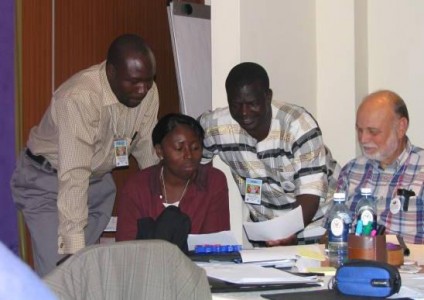By Patricia Thio
(This Article originally appeared in TODAY, the news magazine of Loma Linda University, on November 17, 2006)
The 2006 Pan African Congress on Cleft Lip and Palate (PACCLIP) that Adventist Health International (AHI), Loma Linda University, and the Smile Train sponsored last February brought 150 health professionals together from 10 African countries. The Smile Train—a nonprofit organization that is committed to eradicating the problem of cleft lips and palates—requested that AHI and LLU plan and organize two more meetings within Africa in 2006-2007. In return, Smile Train would sponsor the finances of the meeting.
“One of the outcomes of PACCLIP,” shares Linda D’Antonio, PhD, professor, School of Medicine, and main organizer of the event, “was the development of a small but extremely helpful network of surgeons who have continued over the year to provide valuable information regarding the challenges and solutions for increasing cleft care in Africa.” These surgeons have expressed repeatedly that the challenges for providing cleft care in Africa are unique and therefore require “African specific” solutions in order to build Smile Train partnerships. Because of that, Dr. D’Antonio planned the Smile Train Consensus Conference on Strategies for Increasing Cleft Care in Africa. Held in Nairobi, Kenya, from September 27 to 28, the purpose of the conference was to invite these surgeons and other key stakeholders “to tap into their wisdom about local problems and local solutions to increase cleft care,” explains Dr. D’Antonio.
Thirty-six participants from across sub-Saharan Africa attended the conference. The first day of the conference included an environment scan where participants discussed where cleft providers were, where they are, and where they are going. Then they talked about the trend analysis. For example, attendees concluded that they went from awareness of needs to capacity building, from solo care to team care, from neglect to awareness, etc.
Other discussions included strategies that are for African solutions to increase cleft care. Strategies included: 1) develop funding models that enhance capacity building, 2) capacity building for improved cleft care, 3) building a network and encouraging researchers in cleft lip and palate, 4) establishing standard treatment protocols as an aid to auditing, hence improved quality, and 5) improved level of awareness of cleft care.
Dr. D’Antonio noted that it would be easy to send one team to provide cleft care for a couple of weeks in Africa for the same amount of money that was used to empower the participants of this conference. “This time, however, we developed partners and solutions that will impact the whole entire continent,” she says. “Now participants will be the teachers and light the fires in the bellies of the next generation of cleft surgeons.”
Themba Nyirenda, DDS, an oral surgeon in Malawi, says, “It is pleasing to note that Africa has a wealth of talent, which once properly harnessed, will achieve lasting solutions to our cause. At this point and time, we cannot afford to be complacent. We need to build up, not down.”
The next step is PACCLIP 2007, to be held in February in Ibadan, Nigeria.
